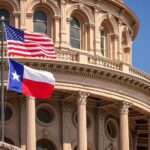Wisconsin bipartisan bill to legalize online sports betting makes fast progress

A bipartisan proposal to legalize online sports betting in Wisconsin is rapidly progressing through the state legislature, according to the Wisconsin Examiner.
Introduced in late October, the bill passed the Senate Committee on Agriculture and Revenue by a 5–3 vote, forwarding it to the Senate floor.
The legislation would allow online sports wagering through a ‘hub and spoke’ system, where servers must remain on tribal lands in accordance with the state constitution. This requires gambling to be managed by federally recognized Native American tribes.
The model mirrors Florida’s framework with the Seminole Tribe and Hard Rock Casino. Supporters, including tribal representatives and legislators from both parties, said legalizing the activity would eliminate the black market, safeguard consumer protection, and create a new source of tax revenue.
Jim Crawford, Attorney General of the Potawatomi Tribe, said, “While online gaming is currently the wild west in Wisconsin with no regulations or protections for consumers. It does not have to be. This bill is a first step in ensuring that consumers will be able to have a legal, regulated and protected way of participating in this extremely popular technology.”
Opponents warned that permitting mobile betting could worsen gambling addiction and expose more residents to risk. Wisconsin Sen. Andre Jacque said he feared allowing bets “anywhere in the state” could fuel addictive behavior.
Verticals:
Sectors:
Topics:
Dig Deeper
The Backstory
Why this push matters now
Wisconsin lawmakers have moved quickly this fall to test whether a tightly controlled online sports betting market can sit within the state’s tribal gaming framework. The speed reflects political alignment that has been rare on gambling issues, a growing appetite to formalize activity already happening on offshore and out-of-state apps, and pressure not to fall behind neighbors that have tapped new tax streams. Central to the debate is whether a statewide mobile experience can be offered without violating Wisconsin’s constitutional requirement that gambling be “conducted” by federally recognized tribes on their lands. That threshold has guided every major design choice so far, from server location to who may operate apps. It also shapes the stakes: if Wisconsin can marry mobile access with tribal sovereignty, it could unlock new revenue and consumer protections while setting a durable model for other holdout states.
The hub-and-spoke blueprint takes shape
The measure builds on a concept advanced by a bipartisan group earlier this year to legalize statewide wagering by routing all bets through servers based on tribal property. Proponents cast the plan as a practical way to comply with the state constitution while meeting consumer expectations for mobile access. In their view, the D.C. Circuit’s approval of a similar framework in Florida adds legal ballast. That rationale is laid out in a bill to legalize online sports betting across the state using a hub-and-spoke system, which cites the federal court decision upholding Florida’s tribal compact after a challenge. Supporters argue the technical routing through tribal servers maintains on-reservation control even when a user taps a phone elsewhere. The Wisconsin proposal also anticipates a tax lift. One of its Senate sponsors told public radio the state could see roughly a 10% increase in gambling tax revenue under the model, though precise projections will hinge on participation, promotional deductions and enforcement against illegal competitors.
Tribal sovereignty anchors a narrower market
Preserving tribal authority over gaming is not just a legal constraint. It is the policy center of gravity. Under current law, sports betting in Wisconsin is limited to on-site sportsbooks at tribal casinos, like the book at Potawatomi Casino in Milwaukee. Lawmakers now want to let those same tribal operators extend betting statewide through their own apps or websites, so long as the servers sit on tribal land. As outlined in a bipartisan bill to allow residents to place sports bets online via tribal platforms, national brands such as DraftKings and FanDuel would not enter the market unless they partnered within this structure and obtained tribal authorization. Backers frame the approach as a modernization that respects compacts and avoids a free-for-all. Opponents warn easy access could fuel problem gambling. A cited study found that more than one in four online gamblers said it is easier to overspend digitally, underscoring the tension between convenience and safeguards. The bill’s authors say the design aims to balance these concerns with clear rules, age verification and responsible play tools.
Legal crosscurrents and consumer protection
The policy debate is unfolding alongside litigation that seeks to draw a harder line between regulated gambling and other forms of speculative wagering. The Ho-Chunk Nation recently sued to block firms it says are running illegal gambling in the state, targeting a prediction-markets platform and a retail broker. The companies dispute that characterization, arguing they operate under federal financial rules rather than as sportsbooks. Those claims are detailed in coverage of the statewide online sports betting bill, which notes that Kalshi maintains it is a federally regulated financial marketplace. The lawsuit highlights how murky boundaries can erode consumer protection and tax collection. Nationally, gambling participation and addiction rates have risen, according to the National Council on Problem Gambling, which estimates up to 10.5 million U.S. adults meet the criteria for a disorder. Lawmakers in Madison argue that a regulated, tribal-led mobile market can push activity into accountable channels with self-exclusion options, deposit limits and oversight that offshore sites lack. Critics counter that ubiquity raises risks regardless of the operator.
Pressure from state peers and a shifting map
Wisconsin’s deliberations come as more holdouts move toward legalization, shrinking the list of states without mobile betting and intensifying competitive pressure. In Hawaii, the Senate approved a measure to legalize online sportsbooks and daily fantasy sports, positioning the state to become the 40th to authorize sports betting if the House concurs and the governor signs. The plan would be mobile only, include at least four licenses, and dedicate funds to problem gambling prevention, as detailed in a bill advancing in Hawaii to legalize online sports betting and fantasy sports. Oklahoma advanced two measures in April, one granting tribes exclusive rights with a 10% fee and another that would put the question to voters if exclusivity stalls. The dual-track strategy is explained in coverage of Oklahoma sports betting bills, which cites revenue scenarios that vary widely depending on market scope and participation. Texas lawmakers also filed a proposed constitutional amendment to take the issue to voters, part of a broader push to join the 38 states that already allow sports wagering. The latest move is outlined in a Texas bill to legalize online sports betting, noting that Gov. Greg Abbott has signaled openness to the concept. As neighboring and high-profile states normalize betting, Wisconsin faces practical questions about leakage to illegal sites and out-of-state apps versus the benefits of a controlled in-state market.
What to watch as the bill moves to the floor
The next phase will test three pillars of the plan. First, legal durability. Florida’s litigation track record gives supporters confidence, but Wisconsin’s constitutional language and compact history are distinct. Any final bill will need careful drafting on server location, revenue sharing and regulatory authority to withstand likely challenges. Second, market structure. Limiting operations to tribal platforms narrows the field and could simplify enforcement. It also keeps more economic value with tribes, consistent with existing compacts. Lawmakers will still need to settle questions on tax rates, promotional credits, license fees and data integrity. Third, public health. Expect debate on dedicated funding for problem gambling services, marketing restrictions, and tools like universal self-exclusion. The experience of states that launched in 2022 and 2023 shows that rollout speed must be balanced with compliance readiness. If Wisconsin proceeds, regulators and tribes will have to build technical standards, test geolocation and identity systems, and coordinate enforcement against offshore operators. The decision in Madison will echo beyond sports odds. It will signal how the state intends to regulate digital risk-taking more broadly, who benefits from that shift, and how consumer protection fits with growth ambitions.







